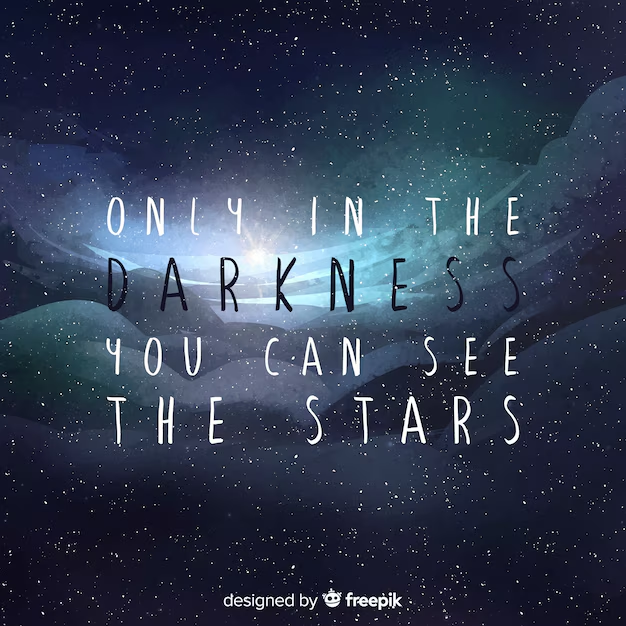
- We used to look up at the sky and wonder at our place in the stars, now we just look down and worry about our place in the dirt. – Cooper
- Love is the one thing that transcends time and space. – Amelia Brand
- We are all just dust in the wind, but it’s our journey that gives us meaning. – Murph
- Sometimes the impossible is just a mindset. – Cooper
- To find a new home, we must first leave our old one behind. – Amelia Brand
- The only way to conquer fear is to take action. – Dr. Mann
- The bravery of humanity has always been found in exploring the unknown. – Cooper
- Life is a series of choices, and those choices define who we are. – Murph
- Time is not something to be feared, but something to be embraced. – Dr. Amelia Brand
- In the vastness of space, even the tiniest action can have enormous consequences. – Cooper
- The universe may be vast, but our love for each other can transcend its boundaries. – Murph
- It’s not about how long you live, but what you do with the time you have. – Dr. Mann
- The stars may guide us, but it is our own choices that determine our destiny. – Amelia Brand
- We are all pioneers, blazing a trail through the cosmos. – Cooper
- The universe doesn’t owe us anything, but it offers us everything. – Murph
- Fear may be a powerful force, but love is even stronger. – Dr. Mann
Interstellar Movie Quotes
- Sometimes the greatest discoveries lie within ourselves. – Amelia Brand
- We are all made of stardust, connected to the universe in ways we cannot comprehend. – Cooper
- Time is a resource, one that must be spent wisely. – Murph
- In the face of adversity, human resilience shines brightest. – Dr. Mann
- Our love for humanity is what drives us to explore the unknown. – Amelia Brand
- The stars are not just distant objects, but a map to our future. – Cooper
- Our greatest strength lies in the belief that anything is possible. – Murph
- The universe is a canvas, and we are the artists. – Dr. Mann
- In the depths of space, we find our true selves. – Amelia Brand
- The unknown is not to be feared, but to be embraced. – Cooper
- We are all explorers, searching for meaning in the vastness of the cosmos. – Murph
- Our actions ripple throughout the universe, shaping our reality. – Dr. Mann
- Our past does not dictate our future; it is our present choices that pave the way. – Amelia Brand
- In the silence of space, we find solace in our own thoughts. – Cooper
- Our journey through the stars is not just a scientific endeavor, but a spiritual one as well. – Murph
Inspirational Quotes from Interstellar
- The universe is not a hindrance, but an opportunity for growth. – Dr. Mann
- We are all interconnected, bound by the same cosmic energy. – Amelia Brand
- In the vastness of the cosmos, we find perspective on our own lives. – Cooper
- Time may be our greatest enemy, but it is also our greatest ally. – Murph
- Our destinies are not written in the stars, but forged by our own actions. – Dr. Mann
- The beauty of the universe lies in its infinite possibilities. – Amelia Brand
- Space is not just a void, but a tapestry of wonders waiting to be discovered. – Cooper
- Our journey through the stars is a testament to the indomitable spirit of humanity. – Murph
- In the cosmos, we find both answers and questions beyond our wildest imagination. – Dr. Mann
- The universe is not just a backdrop for our lives, but an active participant in our journey. – Amelia Brand
- Exploring the unknown is not just an act of curiosity, but a necessity for our survival. – Cooper
- Our place in the cosmos is not predetermined, but shaped by our own choices. – Murph
- In the depths of space, we find both solitude and connection with the universe. – Dr. Mann
- The stars are not just distant lights, but beacons guiding us towards our true purpose. – Amelia Brand
FAQ Interstellar Quotes
How does the poem “Do Not Go Gentle into That Good Night” by Dylan Thomas capture the human spirit’s fight against death, and what does the phrase “rage against the dying of the light” signify?
The poem “Do Not Go Gentle into That Good Night” by Dylan Thomas captures the human spirit’s fight against death by urging people to resist the end of life with all their strength. The phrase “rage against the dying of the light” signifies a defiant attitude towards death, encouraging a passionate and vigorous resistance against the inevitable. This powerful message resonates with the idea that one’s destiny lies above us, in the relentless pursuit of life and purpose, transcending the dimensions of time and space.
How does the concept of “destiny lies above us” align with the idea of humanity as pioneers, and how does it relate to the poem “Do Not Go Gentle into That Good Night”?
The concept of “destiny lies above us” aligns with the idea of humanity as pioneers by emphasizing our inherent drive to explore and transcend our current limitations. In the context of the poem “Do Not Go Gentle into That Good Night,” this idea is reflected in the call to “rage against the dying of the light,” symbolizing the pursuit of greatness and the refusal to succumb to mediocrity. This notion suggests that humans are meant to save the world and strive for higher purposes, continually pushing the boundaries of what is possible.
What does the phrase “capable of perceiving that transcends dimensions of time and space” mean, and how does it connect to the themes of exploration and discovery?
The phrase “capable of perceiving that transcends dimensions of time and space” refers to an advanced level of understanding and consciousness that goes beyond the physical limitations of our existence. This idea connects to the themes of exploration and discovery by highlighting humanity’s quest to understand the universe and our place within it. The relentless pursuit of knowledge and the drive to explore new frontiers are encapsulated in the belief that our destiny lies above us and that we are still pioneers in the vast, barely begun journey of discovery.
How does the fear that “something bad will happen” influence human behavior, and what does it mean to “rage against the dying of the light” in this context?
The fear that “something bad will happen” can significantly influence human behavior by instilling a sense of urgency and caution in our actions. In the context of “rage against the dying of the light,” this fear can serve as a motivating force, compelling individuals to fight against complacency and strive for a meaningful existence. This defiance against fear and uncertainty means that whatever challenges we face, we are meant to leave a lasting impact and not passively accept our fate. It underscores the importance of resilience and determination in the face of life’s inevitable struggles.
How does Christopher Nolan’s film “Interstellar” explore the concept of time relativity, particularly through the experiences of Joseph Cooper, played by Matthew McConaughey?
In Christopher Nolan’s “Interstellar,” the concept of time relativity is explored extensively through the experiences of Joseph Cooper, portrayed by Matthew McConaughey. One significant moment is when Cooper and his crew visit Miller’s planet, where time passes much more slowly due to its proximity to a black hole. Cooper explains, “Time is relative,” highlighting how hours on the planet equate to years back on Earth. This leads to the powerful realization that “we’ve barely begun” to understand the vastness and complexity of space-time. The movie illustrates how time slippage impacts Cooper’s relationship with his children, particularly with Murphy, as years pass for them while only hours pass for him, emphasizing the emotional and physical toll of space exploration.
What is the significance of the quote “Our greatest achievements cannot be behind us” in “Interstellar,” and how does it reflect the film’s themes?
The quote “Our greatest achievements cannot be behind us” in “Interstellar” reflects the film’s themes of hope, perseverance, and the relentless pursuit of progress. Spoken by Professor Brand, played by Michael Caine, this powerful quote emphasizes humanity’s need to look forward and continue breaking barriers rather than dwelling on past accomplishments. It underscores the movie’s message that despite the world’s ending and the numerous challenges faced, including the wasteland-like conditions on Earth, there is always potential for new discoveries and advancements. This mindset drives the characters to embark on the perilous journey through the wormhole to find a new habitable planet, signifying that hope and innovation are crucial for survival and progress.
How does the character of Anne Hathaway’s Dr. Amelia Brand contribute to the film’s exploration of love as a dimension that transcends time and space?
Anne Hathaway’s character, Dr. Amelia Brand, contributes significantly to the film’s exploration of love as a dimension that transcends time and space. In “Interstellar,” Brand passionately argues that love is a powerful force that should be considered when making decisions, stating, “Love is the one thing we’re capable of perceiving that transcends dimensions of time and space.” This perspective is pivotal when the team must decide which planet to explore. Brand’s belief that love can guide them correctly is a profound idea that challenges the purely scientific approach of her colleagues. Her connection with Dr. Edmunds and her enduring hope to reunite with him exemplify the notion that emotional bonds can influence and guide actions across vast distances and time.
How does the theme of sacrifice manifest in “Interstellar,” particularly through Joseph Cooper’s relationship with his children and his mission to save humanity?
The theme of sacrifice is central to “Interstellar,” particularly through Joseph Cooper’s relationship with his children and his mission to save humanity. Cooper’s decision to pilot the mission through the wormhole means leaving his children behind on a dying Earth, a choice that weighs heavily on him throughout the film. The quote “We’ve always defined ourselves by the ability to overcome the impossible” encapsulates his resolve to ensure a future for his children and all of humanity, even at the cost of personal loss. His deep connection with his daughter, Murphy, remains a driving force, as he promises her, “I might be the same age when I get back.” The sacrifices Cooper and his fellow astronauts make highlight the profound personal costs associated with their efforts to explore space and find a new home for humanity.






